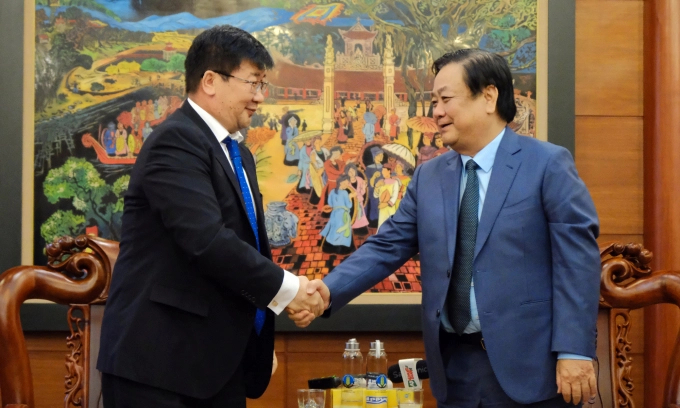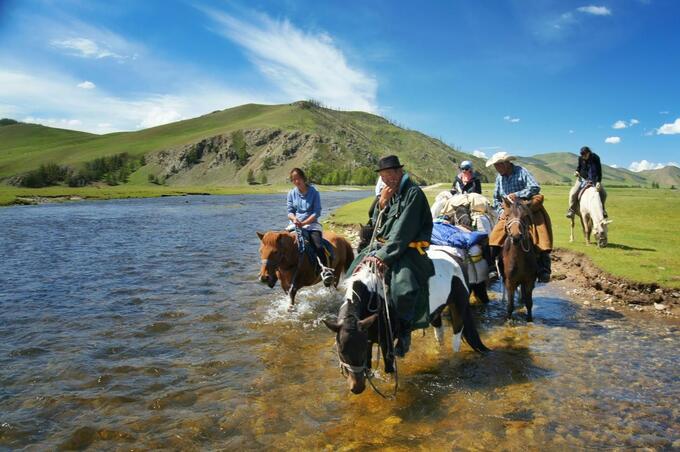May 21, 2025 | 05:19 GMT +7
May 21, 2025 | 05:19 GMT +7
Hotline: 0913.378.918
May 21, 2025 | 05:19 GMT +7
Hotline: 0913.378.918

Minister Le Minh Hoan (right) received the Mongolian Ambassador to Vietnam, Jigjee Sereejav at the headquarters of the Ministry of Agriculture and Rural Development in April 2022. Photo: Bao Thang.
Vietnam and Mongolia have a long history of cooperation and friendship. During the resistance war, Mongolia was one of the first nations to establish diplomatic relations with Vietnam. Vietnam greatly values its relationship with Mongolia. President Ho Chi Minh visited Mongolia in May 1995 during his first overseas trip since the restoration of peace in northern Vietnam.
Since the establishment of diplomatic relations between Vietnam and Mongolia 68 years ago, the longstanding friendship between the two countries has been consistently strengthened and developed despite regional and global fluctuations. The exchange of delegations, both high-level and at all levels, has continued on a regular basis, mutual understanding and trust have been bolstered, and cooperation in all sectors has flourished.
Vietnam will always remember the Mongolian people's great affection, support, and assistance throughout the preceding arduous period of independence and reunification.
Despite recent complex and unpredictable global and regional developments, particularly the Covid-19 pandemic and conflicts, the two countries continue to maintain visits, contacts, and a significant bilateral cooperation mechanism, effective support in pandemic prevention and combat, and positive development momentum in many fields of cooperation. They represent the longstanding relationship between Vietnam and Mongolia.
Vietnam consistently values and seeks to strengthen the bilateral relationship in all fields, including trade, investment, tourism, national defense, security, and the exchange of people, among others.
In which economic cooperation, particularly trade and investment, has significant opportunity for growth. The two-way trade volume roughly doubled between 2017 and 2021, from USD 41.4 million to USD 80.1 million. In 2021, two-way trade volume increased by 37.7% compared to 2020.

Mongolia has strengths in livestock production, leather products, and dairy products.
Despite the high growth rate, the scale of trade between the two nations remains modest in comparison to their potential and current demands. Vietnam can supply Mongolia with agricultural goods, marine products, and construction materials, especially commodities such as rice, sugar, cooking oil, processed foods, and seafood.
In the opposite direction, Vietnam is interested in Mongolia's coal, copper, metals, and textile and footwear raw materials.
Minister of Agriculture and Rural Development Le Minh Hoan, Chairman of the Vietnamese Sub-Committee under the Intergovernmental Committee for Economic, Scientific, and Technical Cooperation, will lead the Vietnamese inter-ministerial delegations to Mongolia from September 13 to 16 to attend the 18th session of Vietnam - Mongolia Intergovernmental Committee.
The delegations also feature Deputy Minister of Industry and Trade Tran Quoc Khanh, representatives of the Ministry of Foreign Affairs, Ministry of Transport, Ministry of Culture, Sports and Tourism, and representatives of a number of research institutes and enterprises.
At the 18th Meeting of the Vietnam-Mongolia Intergovernmental Committee, the two countries are anticipated to explore ways to further cooperation in the current context, assuring practicality and efficacy in sectors that meet the needs and desires of the people on both sides.
In preparation for the 70th anniversary of the establishment of diplomatic ties between Vietnam and Mongolia in 2024, this would be a major step forward in promoting the steady development of friendship, special solidarity, and comprehensive cooperation between the two countries.
The Vietnam-Mongolia Intergovernmental Committee for Economic, Scientific, and Technical Cooperation was established on December 3, 1979, to promote cooperation in economics, trade, investment, science and technology, and other areas of mutual interest between the two countries.
The intergovernmental committee is responsible for monitoring, examining, evaluating, and proposing new forms of cooperation, as well as directing the cooperation. Every two years, the committee meets alternately in Vietnam and Mongolia.
Prior to the COVID-19 pandemic, the two countries' trade turnover climbed by an average of 10 to 15 percent and initially met the objective established at the 17th session of the Intergovernmental Committee of the two nations in December 2019 to raise the two-way trade turnover to USD 100 million.
The majority of agricultural goods exported to Mongolia are dry, such as rice, pepper, and cashews, as well as certain canned items such as dried bananas and canned melons.
Vietnam, the world's largest supplier of fresh fruit, has not yet introduced this item to Mongolia due to the geographical distance (up to 3,000 km).
Translated by Linh Linh

(VAN) In 2024, over 295 million people across 53 countries and territories faced acute hunger—an increase of almost 14 million people compared to 2023, while the number of people facing catastrophic levels of hunger reached a record high.

(VAN) World Environment Day 2025 (June 5) carries the theme 'Beat Plastic Pollution' continuing to emphasize the global urgency of addressing the plastic waste crisis.

(VAN) This was the assessment shared by experts at the workshop titled 'Assessing the Role and Potential of Low-Emission Rice Production Systems in Vietnam,' held on the morning of May 19.

(VAN) Cai Rong Port is the fisheries control center of Quang Ninh, helping to monitor fishing vessels, combat IUU fishing, and remove the EC's 'yellow card'.

(VAN) The German Agricultural Society (DLG) explores the possibility of establishing a mechanization service center in Vietnam’s Mekong Delta to support farmers in accessing and utilizing advanced machinery.

(VAN) On May 16, the Department of Water Resources Management, in collaboration with the Food and Agriculture Organization of the United Nations (FAO), held a signing ceremony for the GEF-8 project document.

(VAN) Food safety, mechanization, vocational training, and market opening are key areas of cooperation expected between the Vietnamese Government and the Federal Republic of Germany.